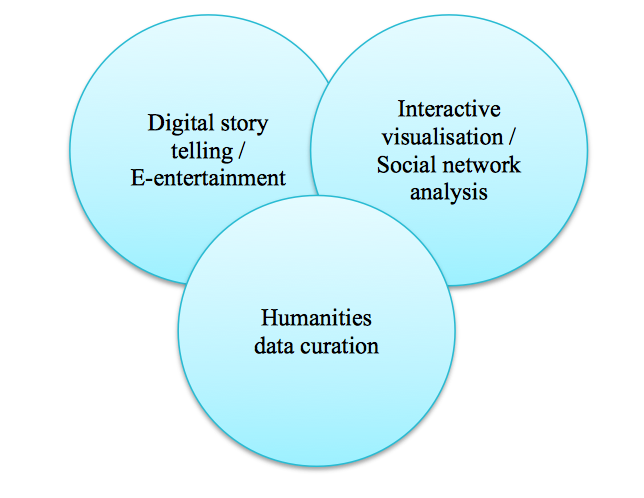International Digital Humanities Symposium, 7-8 Nov 2016
Organized by Digital Humanities Initiative at Linnaeus UniversityCo-sponsored by Växjö Kommun, Växjö City Library
Big Data Consortium with funding from Linnaeus Universitet with Region Kronoberg and Regionförbundet i Kalmar län, IEC -- Information Engineering Centre
Supported by DARIAH-EU
Call for Participation:
Registration is now open and it's free of charge thanks to our sponsors. Please register by 24th October at: https://dinkurs.se/appliance/?event_id=40566
Recent developments in Information and Communication Technologies (ICT) and interactive applications are creating new social tools and conditions for people to connect and interact; therefore changing the ways we communicate, socialize and collaborate. These new forms of digital enhanced communication and collaboration have been rapidly adopted and integrated into people’s everyday lives. Understanding the nature and consequences of these new interactions and social transformations is crucial if we want to design and shape a better future where digital technologies become an integral component of our life. One major challenge we have identified is the exploration of the two-way interactions between society and ICT with a focus on the Humanities. This particular orientation has the potential to become a key success factor for the values and competitiveness of many Nordic countries having in mind recent EU and Swedish political discussions in the field of Digital Humanities.
The 1st International Digital Humanities Symposium will take place in Växjö, Sweden, 7-8 November. The symposium invites and challenges Nordic and European researchers and practitioners in related disciplines to Digital Humanities (DH) to present, discuss and demonstrate different possibilities, current efforts and upcoming trends in this emergent field.
The symposium is organized by Digital Humanities Initiative at Linnaeus University and co-sponsored with Växjö Kommun, Växjö City Library, Big Data Consortium with funding from Linnaeus Universitet with Region Kronoberg and Regionförbundet i Kalmar län, IEC -- Information Engineering Centre with a support of DARIAH-EU and Växjö Library.
Confirmed invited speakers:
Important Dates:
- Submission deadline: Friday, 16 September 2016, 29 September 2016 (now extended due to many requests)
- Notification of acceptance: Friday, 30 September 2016, 10 October 2016
- Symposium´s dates: Monday and Tuesday, 7 and 8 November 2016
Proposals are invited for the following categories:
Presentations (typically 15 minutes plus discussion time, potentially longer if warranted) on work related to the themes of the symposium (see below).
Interactive Demos on work related to the themes of the symposium (see below).
Posters on work related to the themes of the symposium (see below).
- Please email proposals (maximum 1000 words for presentations and 500 words for demos and posters, including aims, research questions, methods, main findings and underlying work, relevance to themes of workshop) to dh@lnu.se.
- Please use the template available at http://goo.gl/OtPQ5 to submit your contribution.
The main themes for the symposium are:
- Defining Digital Humanities. Digital Humanities are still an emerging field and exploring how the humanities may evolve through their engagement with technology is an important discussion topic.
- Cross-sector collaboration in Digital Humanities to address societal challenges. Digital Humanities bear the potential for the academic and public and private sectors to collaborate on interdisciplinary research and innovation to tackle societal challenges.
- Combining methodologies and approaches from different disciplines supported by computational tools. Special emphasis should be given to methodological issues of cross-disciplinary collaboration.
Further timely presentations/demonstrations/posters will be selected from the following topics in the CfP:
- Curating online collections of data and information resources
- Metadata and interoperability
- Data mining large cultural data sets
- Application of tools provided by computing (such as Hypertext, Hypermedia, data visualisation, information retrieval, data mining, text categorization, statistics, text mining, digital mapping) in the humanities
- Digital publishing
- Novel uses and applications of Interactive visualization techniques
- GIS (Geographical Information Systems)
- Multimedia games
- Digital story telling
- Social network analysis
- Bibliometrics /scientometrics / informetrics.
Program Committee
Mats Dahlström, Professor in Digital Humanities, the only Swedish iSchool, The Swedish School of Library and Information Science, University of Borås
Elisabet Göransson, Centrum för teologi och religionsvetenskap, Digital tools in the humanities seminar series, Lund University, Sweden; Forskningsprogrammet Ars edendi, Avdelningen för klassiska språk, Stockholm University, Sweden
Jutta Haider, Information Studies, Department of Arts and Cultural Sciences, Lund university
Isto Huvila, Department of Archives, Libraries, Museums, Uppsala University, Sweden
Annemarie Lloyd, Swedish School of Library and Information Science, University of Borås, Sweden
Maija Paavolainen, University of Helsinki Library, Finland
Franjo Pehar, University of Zadar, Croatia
Michael Pidd, Digital Director of HRI Digital at the Humanities Research Institute, University of Sheffield, UK
Annika Rockenberger, University of Oslo, Norway
Henriette Roued-Cunliffe, Danish Royal School of Library and Information Science, Denmark
Nevena Skrbic Alempijevic, University of Zagreb, Croatia
Kim Tallerås, Oslo and Akershus University College, Norway
Mikko Tolonen, University of Helsinki, Finland
Francesca Tomasi, University of Bologna, Italy
Marijana Tomic, University of Zadar, Croatia
Johan Åhlfeldt, Centre forTheology and Religious Studies, Lund University, Sweden (see also http://dare.ht.lu.se, http://monastica.ht.lu.se,http://projekt.ht.lu.se).
On travelling to Sweden from outside the EU
Please note that symposium´s participants coming from outside the EU and entering into Sweden may be subject to Visa requirements (see http://www.migrationsverket.se/English/Private-individuals/Visiting-Sweden.html).
Registration
Registration for the symposium will be free of charge. A complementary symposium dinner will be offered to all participants of the event.
Registration of participants is open until 24 October 2016, please follow the link: https://dinkurs.se/appliance/?event_id=40566
We hope to see you here in Växjö, Sweden!
Best regards,
The symposium organizing committee
Koraljka Golub, Associate Professor (primary contact), Department of Library and Information Science, School of Cultural Sciences, Faculty of Arts and Humanities, Linnaeus University
Marcelo Milrad, Professor, Department of Media Technology, Faculty of Technology, Linnaeus University
Tamara Laketic, Project Assistant, Digital Humanities Initiative, Linnaeus University



